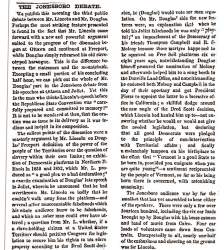Record Data
Transcription
THE JONESBORO DEBATE.
We publish this morning the third public debate between Mr. Lincoln and Mr. Douglas. Perhaps the most striking feature presented is found in the fact that Mr. Lincoln came forward with a new and powerful argument suited to the progress of the discussion begun at Ottawa and continued at Freeport, while Douglas simply rehearsed his old stereotyped harangue. This is the difference between the statesman and the mountebank. Excepting a small portion of his concluding half hour, we can pick out the whole of Mr. Douglas’ part in the Jonesboro debate from his speeches at Ottawa and Joliet. Yet this is the man who thinks Lincoln’s speech before the Republican State Convention was “carefully prepared and committed to memory!” It is not to be wondered at then, that the oration was as tame in its delivery as it was tedious and insipid in its composition.
The salient points of the discussion were a masterly argument by Mr. Lincoln on Douglas’ Freeport definition of the power of the people of the Territories over the question of slavery within their own limits; an exhibition of Democratic platforms in Northern Illinois in 1850 and 1852, which Mr. L. produced as “a good plea to a bad declaration;” a caustic examination of Douglas’ late speech in Joliet, wherein he announced that he had overthrown Lincoln so badly the he couldn’t walk away from the platform – and several other unaccountable falsehoods which his whole audience knew to be falsehoods, and which no sober man could ever have uttered; a question from Mr. L. whether, if a slave-holding citizen of a United States Territory should petition Congress for legislation to secure him his rights in his slave property according to the Dred Scott decision, he (Douglas) would vote for such legislation. On Mr. Douglas’ side the new features were, an explanation that when he told his Joliet falsehoods he was only “playful;” an impeachment of the Democracy of his friends Thompson Campbell and R.S. Molony because those martyrs happened to be squatted on Free Soil platforms six or eight years ago, notwithstanding Douglas himself procured the nomination of Molony and afterwards helped him to a snug berth in the Danville Land Office, and notwithstanding he endorsed both Molony and Campbell in the day of their apostacy and got President Pierce to appoint the latter to a lucrative office in California; a skillful dodge around the new angle of the Dred Scott decision , which Lincoln had hauled him up to – not answering whether he would or would not give the needed legislation, but declaring that all good Democrats were pledged to the principle of non-intervention with Territorial affairs; and finally a melancholy lampoon on his birthplace to the effect that “Vermont is a good State to be born in, provided you emigrate when you are quite young” – a sentiment reciprocated by the people of Vermont, so far as his being born there is concerned, with astonishing unanimity.
The Jonesboro audience was by far the smallest that has yet assembled to hear either of the speakers. There were only a few over fourteen hundred, including the six car loads brought up by Douglas with his brass cannon and band of music from Cairo. Four car loads of volunteers came down from Centralia. Unexpectedly to all, nearly one-half of the enthusiasm and cheering on the ground was for Lincoln.





